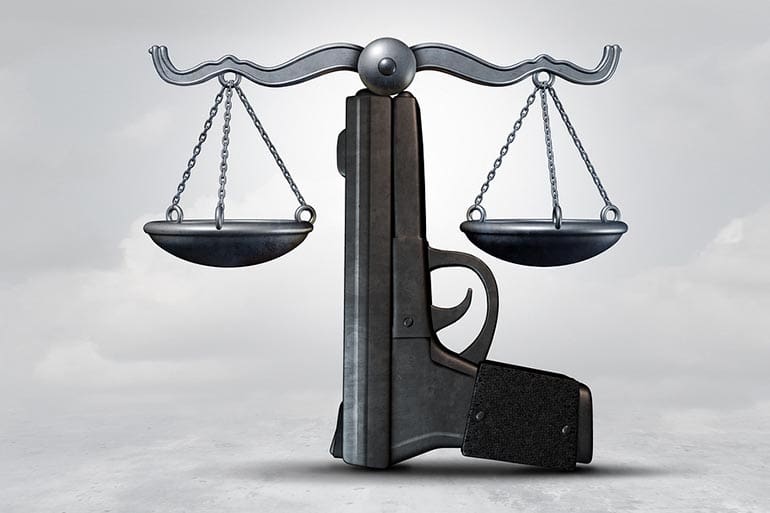The National Rifle Association on Monday filed a lawsuit challenging the DOJ/ATF’s Final Rule redefining who is “engaged in the business” of selling firearms.
The NRA, along with two individuals, filed the lawsuit in the U.S. District Court for the Northern District of Alabama. Specifically, Butler v. Garland argues that the rule, which arguably bans most private sales of firearms, violates the Administrative Procedures Act.
Along with the NRA, the individual plaintiffs are Don Butler and David Glidewell. Butler, from Talladega, Alabama, is an NRA member, firearms hobbyist and collector. Glidewell, from Ragland, Alabama, is also an NRA member, firearms hobbyist and collector, according to the complaint.
Randy Kozuch, executive director of NRA’s Institute for Legislative Action, said the lawsuit is a follow-up on the promise made by NRA when the Final Rule was announced.
“The ATF’s Final Rule stands to turn countless upstanding and well-intending citizens into criminals for exercising their constitutional rights,” Kozuch said in an NRA-ILA news item. “When ATF released this Final Rule, NRA promised to use every means necessary to stop this egregious interpretation of the law. Now that the Supreme Court’s recent decisions in Loper Bright, Cargill, and Rahimi make clear that the ATF does not have unfettered authority to arbitrarily restrict NRA members’ rights to buy and sell firearms, the NRA is fighting back.”
As the NRA pointed out in the complaint: “The Final Rule has already been held to violate the Administrative Procedure Act. The United States District Court for the Northern District of Texas recently held that the ATF exceeded its statutory authority by promulgating the Final Rule and preliminarily enjoined its application against certain states, membership organizations, and an individual.”
As NRA further argued in the complaint, the Final Rule was a devastating blow to America’s lawful gun owners.
“Absent immediate relief, the Final Rule threatens to make felons out of law-abiding citizens who would—but for the unlawful Final Rule—exercise their constitutionally and statutorily protected right to engage in private, non-commercial and unregulated transactions involving firearms,” the complaint stated. “But for the reasonable fear of being unlawfully subjected to administrative, civil and criminal proceedings for violations of the GCA as ‘administered’ by the Final Rule, plaintiffs and their members could and would engage in conduct protected by the Constitution and federal statutory enactments but made unlawful by the Final Rule.”
The NRA and the individual plaintiffs are requesting that the court issue a temporary restraining order and/or preliminary injunction barring defendants from enforcing the Final Rule against Plaintiffs, their members, and those with whom Plaintiffs and their members engage in protected private transactions; issue an order under the Administrative Procedure Act holding unlawful and setting aside the Final Rule; and issue a declaratory judgment and permanent injunction barring defendants from enforcing the Final Rule.





Had an uncle who would buy a gun, shoot it/show it off for 6 months, then trade it, sell it, or even give it away – he did this for decades, and l doubt he made a dime – or tried.
He did not live to see this day, but did predict it…
At first, I was puzzled about how this rule differed from the law as it’s stood for decades. There’s never been a “gun show exception”, there’s never been an exception made for guns sold by mail or over the Internet. So what’s the big deal?
One minor change is that they switched from “predominantly for livelihood and profit” standard to “predominantly for profit” – i.e. they dropped the “livelihood” part. But even that doesn’t seem too bad, a side business is still a business.
Here’s where the real mischief happens deeper in. Because the rule denies the government needs to prove you actually did earn a profit [Fed Register vol.89 n.77 pp. 28981]. Instead, they include a laundry list of innocent acts as establishing a presumption that you intended to earn a profit [Ibid.], including:
-Advertising guns for sale;
-Renting space to display or even store guns you intend to sell;
-Keeping any record of monies obtained through the sale of a gun.
DaveL,
You bring up interesting points.
I also want to bring up the “hobby” notion. It is entirely possible to have a true hobby (in the plain, every-day English sense of the word) which generates a modest profit. For example, someone could have an antique furniture hobby where he/she buys antique furniture items and then somehow sells them for a total profit of a few hundred dollars every year. Should we consider that a business and require full blown documentation, bookkeeping, accounting, licensing, permitting, insurance, etc.???
If we answer, “no,” to my antique furniture hobby example in my previous paragraph, why would we change our answer to, “yes,” if we change the hobby from antique furniture to modern firearms?
Let’s be honest. Many governments simply do not want us buying, selling, or even possessing firearms. And if those governments believe that they cannot outright ban firearms, they will try to implement de facto bans or implement other mechanisms to minimize firearms any way that they think they can. That is what this entire ordeal is all about. Our federal government does not think it can outright ban firearms. Thus the next best alternative is to minimize the sale, purchase, and possession of firearms any way that they think they can get away with. Hence the ATF recently altered their definition of firearm businesses to further reduce firearm buying, selling, and possession.
Instead of quibbling about definitions of hobbies versus businesses, we should be pushing all of our governments to keep their mitts out of our proverbial inalienable rights “cookie jar”.
ATF Uses Illegal Gun Registry In Trump Assassination Attempt Investigation.
https://www.youtube.com/watch?v=XpUKWlhLaDo
With Chevron deference found unconstitutional this lawsuit should be successful in overturning this ATF Diddlerbach rule.
BREAKING: Did Trump assassin meet with FBI or DOJ in DC?
https://www.youtube.com/watch?v=0TBLDCJEkRE
UPDATE: Did Trump assassin visit with the Secrete Service?
https://www.youtube.com/watch?v=RqocVWWjSPg
BREAKING! Trump assassin’s home reportedly sanitized by someone prior to authorities searching it.
https://www.youtube.com/watch?v=bscgo3wjKLI
The plot thickens🙄and there’s a whole bunch of “bad actor’s” who could be involved!
I question the veracity of this video. I don’t doubt that all of our devices which display Internet websites have unique advertising identifiers and that various advertising entities log which advertisements display on which devices. What I DO doubt is that some civilian entity can access advertising logs and determine which advertising identifiers were in a given precise location.
The ATF needs to be deep sixed along with the DOJ and start over from scratch
Comments are closed.